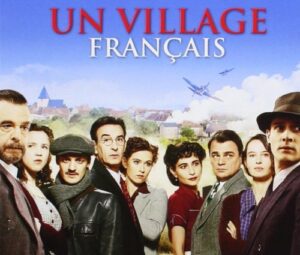what happens to all of the characters in a french village?
A Historical Drama and a Master Class
Two months ago, my husband'south Italian friend and folklore professor colleague — the one with the identical twin girls — recommended a 10-year-old French historical TV series that was released with subtitles in the United States in 2018. Titled A French Village, it follows a fictional small town located in Occupied France across the river from the collaborationist Vichy Regime from June 1940, when the Nazis took over, to the years correct after the war. Richard and I started watching at the end of September, and we're at present midway through the third of seven seasons, in the middle of 1942. We usually watch an episode a night. And while it's probably not the best idea to sentinel a serial about a town terrorized by a fascist occupation regime while we alive in New York Metropolis during an election that volition determine whether the United States remains a more-or-less functional democracy or, in the midst of a deadly pandemic, descends into a chaotic authoritarianism with a ruling party that hates liberal cities, we cannot plow abroad.
We are addicted.

Every bit a writer of fiction who looks at other fictional creations to encounter how they work and what lessons I tin use to my own projects, I see A French Village and its addictive qualities as a master grade. It'south virtually relevant to me because I write historical fiction; if you lot write fantasy, for instance, you may find Game of Thrones more relevant. And while the series is not without its flaws, including plot holes and retconning (creating new scenes that retroactively change established facts or interpretations), it stands out for creating complex characters that the viewer cares near and cliffhangers that get out those characters in concrete and/or emotional danger.
Let's talk about characters commencement. A skilful series has enough characters to explore events and relationships, and each of those characters has depth and complexity. Non enough characters, and there aren't enough layers to the story, and if any of those chief characters dies or goes away, the story is poorer for their absenteeism. While a couple of my favorite characters in A French Village oasis't made the transition from the 2d to the third flavour, the remaining ones are interesting plenty to conduct the story. In addition a fascinating new character has just arrived, a Globe War 2-era Scheherazade whose talents as a fabulist add intrigue to the series while introducing an element of metafiction: the ability to tell a story and maintain the interest of the listener means survival for her…and for this series. (Readers of my reviews here and on The Pirate Tree may have already guessed that I'thousand a sucker for metafiction, defined equally a story or elements within information technology that offer commentary on traditional narrative techniques.) At the same time, there aren't too many characters, or characters so poorly differentiated from each other, that the audience loses runway of them or doesn't care enough about them to continue watching.
How does the writer differentiate characters in a large-enough cast to back up a serial? The writers of A French Village exercise and then by giving each of the characters a articulate want line, a network of relationships, and complex dilemmas that show each ane capable of, for instance, both great generosity and monstrous cruelty. Because they alive under an occupation, they have to brand compromises and even kindness has its cost. This is virtually clearly embodied in the character at the middle of the story, village doctor Daniel Larcher who becomes the mayor later the original mayor flees the advancing German army. Correct away, he delivers the baby of a Spanish refugee, simply the mother doesn't survive. Daniel's wife Hortense, unable to have a kid of her own, seeks to raise the child, but somewhere out there is a bereaved begetter. Will the Larchers — among the wealthiest villagers — give the kid love and a better chance for a practiced life in the midst of wartime, or does the child belong with his refugee begetter? And what unethical arrangements volition Daniel and Hortense brand with the well-pregnant just less-than-competent chief investigator for the police and his handsome, ambitious immature underling with an attraction to older women? Anybody in A French Hamlet is both a hero and a villain — even the children who the series writers don't hesitate to place in horrific situations outset with the very first episode.
 Besides their desires — mostly for love as they interpret information technology — the characters connect with viewers through their acts of kindness. Except for the High german SS and Gestapo officials, there are no totally bad people. The overzealous young police investigator Jean Marchetti probably comes closest, and the filmmakers finer juxtapose his practiced looks with his difficult eye and manipulative personality. (Or perhaps Marchetti is destined for moral greatness later in the series.) Caring for children and others who are vulnerable, helping Jews to escape the death camps, and risking their lives in the Resistance offer a measure of redemption to those who cheat on spouses or intermission up marriages. Viewers likewise see that beingness role of the Resistance, the "good guys," comes with its ain moral dilemmas, from not doing enough to save lives to executing informants before they denounce the unabridged group. This is a historically-accurate portrayal of a real Resistance and what it'due south like to be office of one. A French Village shows usa the potential, good and bad, of fundamentally decent but flawed people. At a time in our nation's history in which we wonder about the primal decency of our neighbors and how their choices will impact those who are most vulnerable, this series carries additional resonance.
Besides their desires — mostly for love as they interpret information technology — the characters connect with viewers through their acts of kindness. Except for the High german SS and Gestapo officials, there are no totally bad people. The overzealous young police investigator Jean Marchetti probably comes closest, and the filmmakers finer juxtapose his practiced looks with his difficult eye and manipulative personality. (Or perhaps Marchetti is destined for moral greatness later in the series.) Caring for children and others who are vulnerable, helping Jews to escape the death camps, and risking their lives in the Resistance offer a measure of redemption to those who cheat on spouses or intermission up marriages. Viewers likewise see that beingness role of the Resistance, the "good guys," comes with its ain moral dilemmas, from not doing enough to save lives to executing informants before they denounce the unabridged group. This is a historically-accurate portrayal of a real Resistance and what it'due south like to be office of one. A French Village shows usa the potential, good and bad, of fundamentally decent but flawed people. At a time in our nation's history in which we wonder about the primal decency of our neighbors and how their choices will impact those who are most vulnerable, this series carries additional resonance.
Once we've come to care about the characters in A French Village, the creators hook u.s. with the cliffhanger. It can come in diverse forms, and the variety prevents it from being seen as manipulating the audition. Sometimes, it'due south a concrete threat — machine guns blazing at beloved characters who are running away. Sometimes, it's a moral choice — a character faced with surrendering a want or objective to prevent a greater harm. Sometimes, it's a mystery, or a dreadful consequence about to happen. In many cases, the next episode doesn't pick up in the middle of the cliffhanger but shows the resolution days, weeks, or months after, leaving the viewer to fill in the missing space. Information technology'south a clever style of keeping the series moving forward and inviting the viewer into the story, imagining what happened in the interval and wondering what volition happen next. Novelists, especially for middle course readers, are encouraged to finish chapters on cliffhangers so immature readers won't put the book down and forget to pick information technology up again. This series is especially skilful at showing the kinds of cliffhangers that can be brought into play.
A final note: This series was created in France and presented with subtitles. We in the U.Due south. have long been indoctrinated into believing in the supremacy of our ain film and TV industry, and, yes, Hollywood has had enormous impact on the world'south cultural output. Nevertheless, our own cultural output has stagnated over the years, inventiveness subsumed to bean counters pushing stock characters and uncomplicated, recognizable tropes. We have lost the ability to fill in the white space, to question received orthodoxy, to recollect critically nearly our lives, relationships, and actions past and present. In a recent op-ed in The New York Times, Michelle Goldberg argues that the by 4 years, with its conflicts and atrocities, have not enriched our culture but rather have impoverished information technology, equally a would-be dictator takes over more than of our national headspace. I would say that our loss of cultural leadership predated the ascension of Trumpism, contributed to that rise, and won't exist turned effectually until we recognize that we're in dialogue with the world'due south struggles and neither separate nor infrequent. We have a lot to learn. It'due south fourth dimension to listen, to learn, to imagine over again.
Source: https://lynmillerlachmann.com/a-historical-drama-and-a-master-class/
0 Response to "what happens to all of the characters in a french village?"
Post a Comment